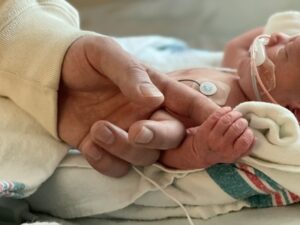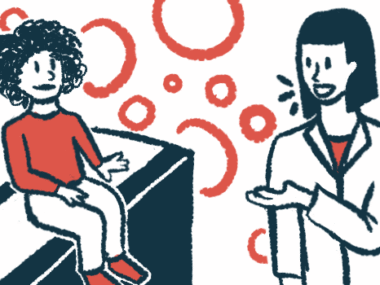The journey to my newborn son’s diagnosis of Alagille syndrome
Finley's premature birth and NICU stay started us on our search for answers
Written by |

Before my son Finley was born in 2021, I had never heard of Alagille syndrome. For that matter, I had only surface-level knowledge of the rare disease world. My wife Dani’s pregnancy with our first son, Jackson, now 6, was about as normal as possible. He was nearly born on his due date, and we had almost zero complications along the way.
Finley’s story was the complete opposite. It was a high-risk and challenging pregnancy for my wife and me. We thought we were prepared for our second child, having been through the process, but instead we were in unknown territory before he was born, as he was measuring small for his gestational age.
That was a daunting feeling. And the unknowns only intensified as we ventured further into the rare disease world.
Our exhausting stay in the NICU
Finley was born a month premature. It was a whirlwind delivery. While he was only 5 pounds, he appeared healthy, so we thought the challenges from pregnancy were behind us. Turns out that was wishful thinking.
Finley was moved to the neonatal intensive care unit (NICU) because he had trouble expanding his lungs — a common issue for premature babies. Seeing your child hooked up to tubes is a sobering visual. I had a hard time being there with him at first. We thought it would be a quick stay to get him acquainted with the world, but as the oxygen tubes were removed, our stay continued.
Finley was jaundiced, and his symptoms weren’t improving, despite treatment in the NICU. About a week into our NICU stay, doctors started to hypothesize about what Finley could be experiencing. We asked them to write their ideas on the whiteboard so we could keep track.
The options ranged from “he could be totally healthy” to “he may have only weeks to live.” As a parent, it’s impossible not to freak out with this information. Looking back, what was really going on wasn’t even on our list of possibilities.
All of this was happening in the midst of the COVID-19 pandemic, so NICU rules allowed only one parent to stay overnight. My wife hadn’t left the hospital since the delivery, meaning she hadn’t seen Jackson at all for more than a week. She finally agreed to leave Finley and spend the night with Jackson at our home.
I will never forget my night in the NICU alone with our newborn. We had no answers, only speculation. That bred fear, which was stoked by exhaustion. I’d just had the news dropped on me that my newborn son wasn’t healthy, and he might never be. I was alone in the hospital room with a sleeping Finley and I couldn’t stop sobbing.
Dani and I had been waking up to help feed him at night. But on that night, after I finally passed out from exhaustion, the nurse didn’t wake me to assist Finley. They took over and let me sleep. I assume they heard me having a hard time, and I am forever thankful for their help.
Finally getting answers
After two weeks, we were able to leave the NICU. Dani and I were elated to reunite with Jackson and have him meet his brother for the first time. There were tears of joy as we drove away from the hospital.
We were scheduled to meet with a gastroenterologist (GI) in a few weeks, but Finley was struggling. At one of his pediatrician checkups they discovered a heart murmur. His jaundice levels remained high, and he wasn’t gaining weight. We couldn’t wait for the scheduled GI appointment.
Our pediatrician sent us to be admitted to our local children’s hospital to ease the burden of all the specialists we needed to see. That trip to the hospital turned into an eight-day stay that, while stressful, produced answers.
We met with GI doctors, a cardiologist, a urologist, dietitians, and other specialists. Finley underwent ultrasounds, a liver biopsy, an echocardiogram, and multiple blood tests. It was during this stay that we first learned about Alagille syndrome. I had the same reaction to learning about this condition as nearly 100% of the people we talk to: “I haven’t heard of that.”
The theme of Finley’s first few months of life was waiting. Waiting for answers. Waiting for tests. Waiting for a resolution to what he was experiencing. Finally, that answer came, and it confirmed Finley’s diagnosis of Alagille syndrome. This started the process of us becoming advocates for our son and learning everything we could about the condition. It has been and continues to be a journey.
I cannot wait to share more stories about our challenges, successes, tears, laughs, and so much more in this column. I hope you come back to learn what it means to be rare with Finn.
Note: Liver Disease News is strictly a news and information website about the disease. It does not provide medical advice, diagnosis, or treatment. This content is not intended to be a substitute for professional medical advice, diagnosis, or treatment. Always seek the advice of your physician or other qualified health provider with any questions you may have regarding a medical condition. Never disregard professional medical advice or delay in seeking it because of something you have read on this website. The opinions expressed in this column are not those of Liver Disease News or its parent company, Bionews, and are intended to spark discussion about issues pertaining to liver disease.




